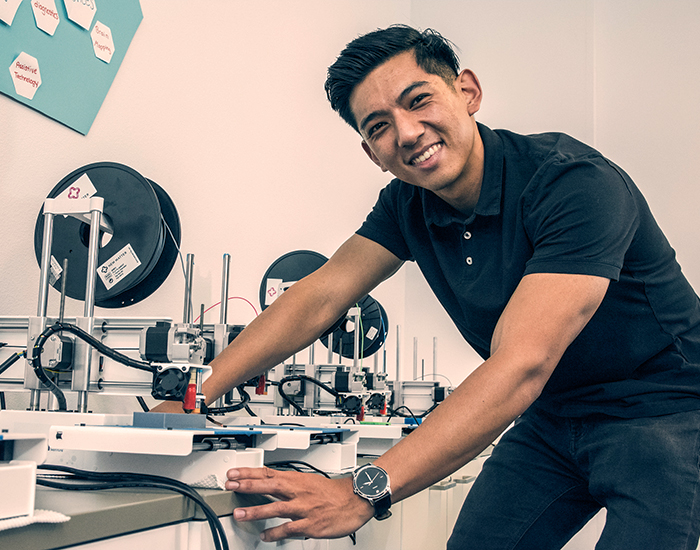Keck Graduate Institute's (KGI) Master of Science in Medical Device Engineering (MSMDE) program received a $200,000 grant in December 2019 to further develop infrastructure for their Medical and Assistive Device (MAD) Lab. This grant was awarded by the Fletcher Jones Foundation, who supports educational programs in higher education.
"The MAD Lab functions as a blend between a classroom and a maker space, with group tables, active learning classes, and lots of equipment."
"We design and prototype with 3D printers, Laser Cutters, and vacuum formers," said Anna Hickerson, MSMDE Program Director and Assistant Professor.
The lab opened in the fall and became available for students to use during and after class for collaborating, designing, prototyping, and showcasing their work. Hickerson has been using the grant money to invest in more furniture, computers, and items for the lab such as physiological testing equipment.
Hickerson has been at KGI since 2005 and taken on many roles since then, including sample preparation with biologists to design portable, low-cost point-of-care testing equipment. In addition to teaching the Device and Diagnostic Product Development course, she has served on the curriculum review committee and led the Medical Device Development Bootcamp for STEM undergraduates.
Outside of KGI, she has consulted for medical device companies and is a listed inventor on 12 issued U.S. patents. Her specialty is cardiovascular devices.
This is the first year that KGI has offered the MSMDE program. Although currently only five students are pursuing this degree, the classes are bolstered by students from other disciplines, primarily from the Master of Business and Science (MBS), Master of Science in Applied Life Sciences, and Postbaccalaureate Premedical Certificate (PPC) programs.
"PPC students have insights into what kinds of products need to be built, MBS students offer their knowledge on aspects of product development such as regulatory hurdles and budgeting, and the engineering students have the skills to work across these disciplines in teams to create functional designs," Hickerson said.
This blend of perspectives enriches the collaborative nature of the program and helps to prepare students for careers that involve applying engineering to healthcare problems. Specifically, students gain skills in the areas of product development, project management, and quality management.
Throughout the program, students obtain practical, hands-on experience and are provided opportunities to observe how individuals are interacting with these devices. In the course Clinical Experience for Engineers, students complete 40 hours of clinical observation experience, which provides them with a deeper understanding of clinical environments, how to interact with patients and providers, and how to design devices to better serve patient needs.
“I am deeply grateful for this funding and am excited to build out a Medical Device Engineering lab of the future, now more critical than ever," Hickerson said. "And to our prospective students, what would you want in this lab?”
For more information about KGI's Master of Science in Medical Device Engineering program, visit kgi.edu/msmde.
